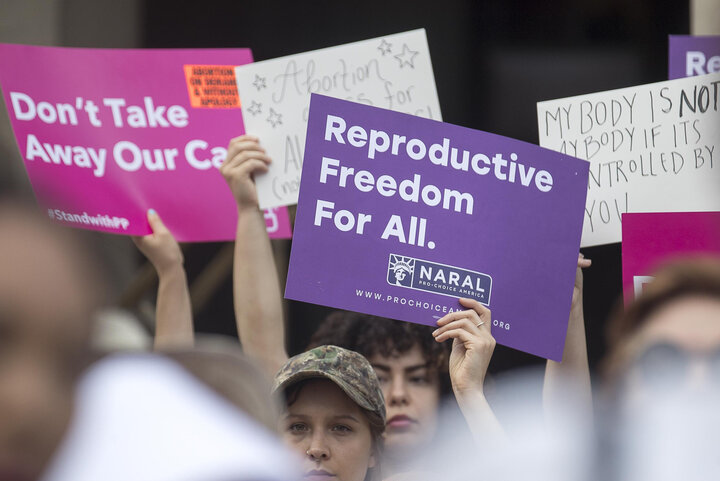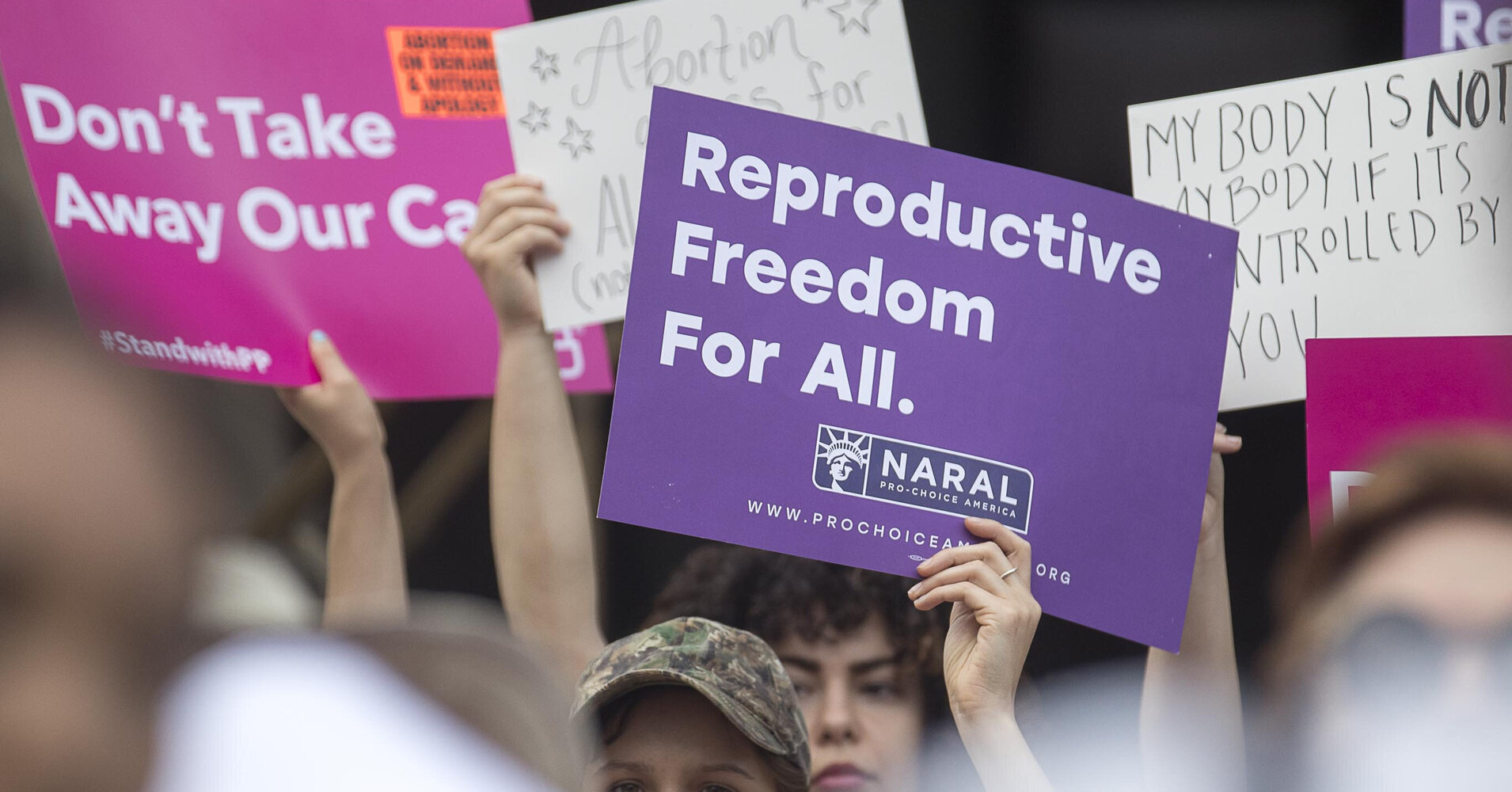[ad_1]
Anti-abortion activists and legislators are coming for Roe v. Wade, and as of this week, they are inching ever closer. On Tuesday night, the (nearly all-male) Alabama Senate voted to advance a draconian near-total abortion ban, without exceptions for rape or incest, which now heads to Alabama Gov. Kay Ivey (R).
If Ivey signs the bill, it will become the most restrictive abortion law in the nation, coming on the heels of bills passed recently in Georgia and Ohio that ban abortions after six weeks.
Last year alone, 15 states adopted 27 new restrictions on abortion and family planning. And the ultimate goal of many of the architects of these laws, and the abortion bans passed in Ohio, Georgia and Alabama, is to use state legislation to get Roe v. Wade overturned by the Supreme Court, which is now stacked in conservatives’ favor.
To be clear, this isn’t a goal that progressives have intuited, but one that legislators have come right out and stated on the record.
“It is important that we pass this statewide abortion ban legislation and begin a long overdue effort to directly challenge Roe v. Wade,” Alabama Lt. Gov. Will Ainsworth (R) said last week.
Here is the ugly truth: Banning abortion is about restricting women’s freedom, autonomy, mobility, sexuality and self-determination. Laws like the ones passed in Georgia, Mississippi and Alabama ― laws that completely ignore things that actually decrease abortions, like comprehensive sex education, accessible birth control, and greater social services for parents and children ― are, quite literally, an attack on women’s lives.

As Emily’s List President Stephanie Schrock put it in a statement on Wednesday morning: “The threat against women’s rights is not theoretical. It’s here, it’s real, and it has dire consequences for American women and families.”
So, what do you do about this, other than scream into the void or vow celibacy in a misguided attempt to fight legislation that limits women’s bodily autonomy and punishes them for having non-procreative sex by vowing to avoid non-procreative sex? (#SexStrike, we’re lookin’ at you.)
Donate to abortion funds and other local organizations.
The simplest and most direct way you can use your money to push back on draconian anti-abortion laws is by donating to abortion funds. Abortion funds are literally pools of money provided to people seeking abortion care. They can be used to cover not just the procedure itself, but travel and lodging.
At the national level, you can donate to the National Network of Abortion Funds. (A list of all individual funds can be found here.)
If you want to ensure that your donations are focused on people seeking abortion care in Alabama, donate directly to the Yellowhammer Fund.
For Ohio, donate to Women Have Options, which not only funds abortion care but also access to contraception and emergency contraception.
For Mississippi, donate to the Mississippi Reproductive Freedom Fund, which also provides free emergency contraception and support for community-based comprehensive sex education.
For Georgia, donate to the Women In Need Fund.
Support individual clinics with your time and money.
Though abortion is still legal in all 50 states, access to abortion is increasingly hard to come by. As of January 2019, eight states ― Arkansas, West Virginia, Kentucky, Mississippi, North Dakota, South Dakota, Wyoming and Missouri ― only had one provider left, and more states have fewer than five clinics whose doors remain open.
Alabama has just three: the Alabama Women’s Center for Reproductive Alternatives (fundraiser here), Reproductive Health Services of Montgomery and the West Alabama Women’s Center, both of which told HuffPost that those who wish to donate should give to the Yellowhammer Fund.
If you have time you’d be willing to give, consider becoming a clinic escort. (If you’re in the Montgomery area, P.O.W.E.R. House is a great place to start.)
You can find a clinic in your area through the National Abortion Federation.
Support candidates who will protect abortion rights at the state and local level.
It’s important to remember that these laws didn’t just come out of nowhere. There has been a yearslong effort by the Republican Party to stack state legislatures with anti-abortion elected officials.
Both Amanda Litman, co-founder and executive director of Run for Something, and Christina Reynolds, vice president of communications for Emily’s List, told HuffPost that progressives often focus on federal races (which are, of course, important!) at the expense of state and local ones. And now, those state and local legislatures are making decisions that directly affect the lives of millions of women.
Activism is critical, but at the end of the day, if there’s no opponent for voters to pick from, it’s all for naught.
Amanda Litman, co-founder and executive director of Run for Something
Both Litman and Reynolds stressed the need to recruit and support candidates (specifically female candidates) who will run for these state and local seats. But building a pipeline takes time ― and money.
“We have to force these guys (and they’re mostly guys) to defend their votes,” said Litman, whose organization specifically supports young progressive candidates at the local level. “Activism is critical, but at the end of the day, if there’s no opponent for voters to pick from, it’s all for naught. They won’t be afraid for their jobs, so they won’t change their actions. We have to recruit amazing progressive pro-choice women to run in these districts. Whether or not they win, they’ll hold the incumbents accountable, make them campaign, and force them to spend money.”
Litman vowed that every donation to Run for Something would “go toward recruiting progressives to run in Alabama, Georgia, and every other state where our values are on the line.” You can donate to Run For Something here and Emily’s List here.
Speak up, speak up, speak up. (Men ― that means you, too!)
This one may feel less tangible, but history shows that political movements and public protest can create change. So make your opinions and your stories heard.
“The bills in Georgia and Alabama threatening women’s reproductive rights and criminalizing abortion represent the culmination of a wave of regressive bills seeking to control women’s bodies and reproductive rights,” said Carmen Perez, executive director of The Gathering for Justice. “Women in our resistance movement need to call their state representatives to see whether they support laws that seek to roll back Roe v. Wade.”
And although abortion is often spoken about as a “women’s issue,” these laws impact everyone. So, men, time for you to raise your voices, too.
You can get out onto the streets and into state capitols and protest. You can flood elected officials’ offices with phone calls and emails. (Ivey’s office can be reached here.) You can tell your story on social media or to your friends or to your family members.
“It’s up to us to ensure that voters understand what these laws mean and how real the threat is,” said Reynolds. “We can help by fact-checking [President] Trump’s lies [about abortion] and by sharing the stories of the women and families who understand firsthand the challenges created by bans and restrictions.”
REAL LIFE. REAL NEWS. REAL VOICES.
Help us tell more of the stories that matter from voices that too often remain unheard.
[ad_2]
Source link

